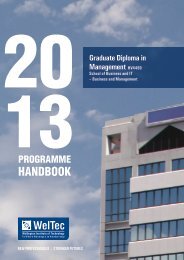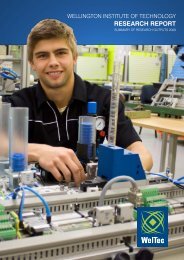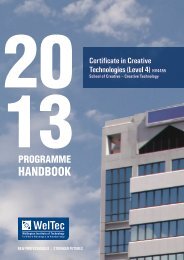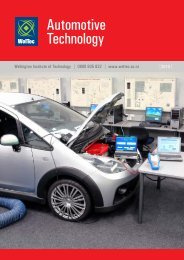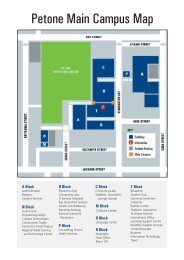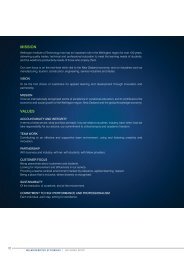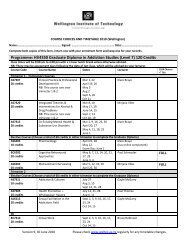Download PDF (7.6MB) - Wellington Institute of Technology
Download PDF (7.6MB) - Wellington Institute of Technology
Download PDF (7.6MB) - Wellington Institute of Technology
Create successful ePaper yourself
Turn your PDF publications into a flip-book with our unique Google optimized e-Paper software.
A Great Year for ResearchOur research in 2012 coveredpr<strong>of</strong>essional areas, trades,technology and activities to increasethe productivity <strong>of</strong> local and nationalbusinesses.Much <strong>of</strong> our research is aimed at building New Zealand’seconomy, something the Government holds as a priority. Ourongoing involvement in the Ministry <strong>of</strong> Business, Innovation andEmployment <strong>Technology</strong> technology transfer voucher programmefurther demonstrates that we have the expertise to help businesseswith economic growth.2012 was our first year in the Performance Based Research Fund.Participating allows us to benchmark ourselves within the sectorand set ourselves increasingly high standards for research into thefuture.It is important that our research informs the teaching <strong>of</strong> the degreeswe <strong>of</strong>fer. We updated our research policy and established acentrally-managed Research Office in 2012.Here are just a few examples <strong>of</strong> the exciting and valuable researchbeing done at WelTec. More detail on all the research undertaken atWelTec in 2012 is available in our 2012 Research Report.Research proves success <strong>of</strong> WelTec diplomaJoany Grima’s two research projects in 2012 put the spotlight onthe Graduate Diploma in Event Management, a programme shehas taught since its introduction in 2010.Half the weighting <strong>of</strong> the one-year full-time programme is basedon an industry practicum for each student. For her research Joanyapproached practicum hosts to find out about their experience<strong>of</strong> having a student working for them. She then looked at theemployability outcomes <strong>of</strong> graduates to find out if they have beensuccessful in securing employment in the events industry.The results were positive with eighty percent <strong>of</strong> hosts beingenthusiastic about the practicum experience and one third <strong>of</strong> hostsgoing on to employ the student.Graduate employability was also excellent, with approximately65 percent <strong>of</strong> students employed in industry within six months <strong>of</strong>completion.Working togetherTrish Baker, a researcher in WelTec’s School <strong>of</strong> Business, continuedher study into cooperative learning in education (group work). Shecontinues to gain important insights on the subject after 12 years<strong>of</strong> investigation and now collaborates with Whitireia researcher, JillClark.Trish and Jill’s research investigates student group work,particularly diverse groups, which include international studentsrepresenting many different ethnic groups. While overseasresearch shows positive outcomes from group work, Trish and Jillhave confirmed that New Zealand teaching staff have <strong>of</strong>ten beenunprepared for managing group work so it is beneficial for studentsand ensures academic results that honestly reflect students’ inputand skill. Trish’s research has confirmed that for students to learnthe necessary skills to work well in groups, their teachers need tostructure and support group work properly.Ako Aotearoa, the National Centre for Tertiary Teaching Excellence,has recognised Trish and Jill’s work by commissioning them tocreate a national education programme for tutors to learn how tomake group work effective in teaching.With five published studies in 2010 and 2011, Trish’s researchcontributed to WelTec’s participation in the 2012 PBRF qualityevaluation <strong>of</strong> research.Researching pr<strong>of</strong>essional practiceThe subject <strong>of</strong> WelTec Design Lecturer Tony De Goldi’s research isnearly two decades <strong>of</strong> his own career in Maori theatre in Aotearoa.As well as looking closely at his contemporary theatre work, Tony’sresearch considers its place in the wider context <strong>of</strong> New Zealand artand design. Tony then brings this knowledge and awareness backinto his interior design, theatre design and construction teaching atWelTec. In 2012, Tony’s set and costume design for the NBR NewZealand Opera’s production <strong>of</strong> Jenny McLeod’s opera Hohepawere highly acclaimed for their important contribution to realisingboth the writer’s and director’s vision for the project, as well ascontributing to Tony’s ongoing research.As well as teaching, Tony is now mentoring and inspiring two youngdesigners, both WelTec graduates, as they work on their owntheatre designs. The designers benefit from the 20 years he hascontributed during a formative period in Maori theatre.Reducing industrial wasteSilver Lining, Hutt City Council’s commercial waste reductionproject, is tapping into WelTec’s knowledge, and research intoindustrial waste management.The Silver Lining Project aims to help local businesses to reducewaste to landfill, and to identify long-term reuse and recyclingopportunities. In 2012, Bob Robinson from WelTec’s Centre forSmart Business undertook Silver Lining’s waste scoping studies.The studies researched solutions to reduce, reuse and recyclebusiness waste.Bob, who has a background in manufacturing and is widelyrecognised for his knowledge in resource efficiency andsustainability management, has worked with local body councils forthe last seven years on environmental programmes. He describeshis role as being to research solutions, make connections betweenbusinesses and facilitate waste reduction. Because <strong>of</strong> the wayWelTec Connect’s Centre for Smart Business works, the SilverLining Project is also building WelTec’s knowledge base, so that itis available to others in the future.2012 ANNUAL REPORT | 37



